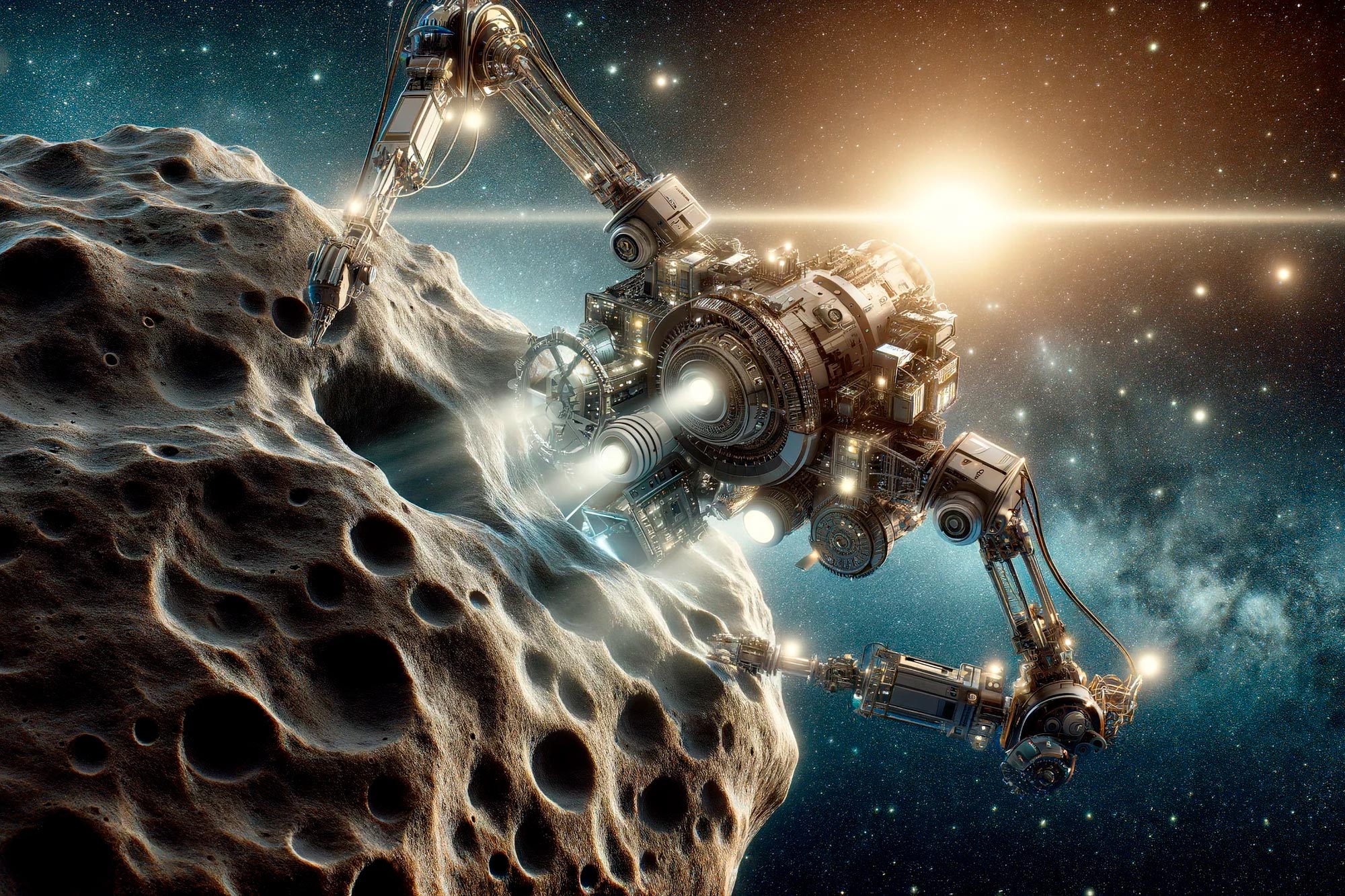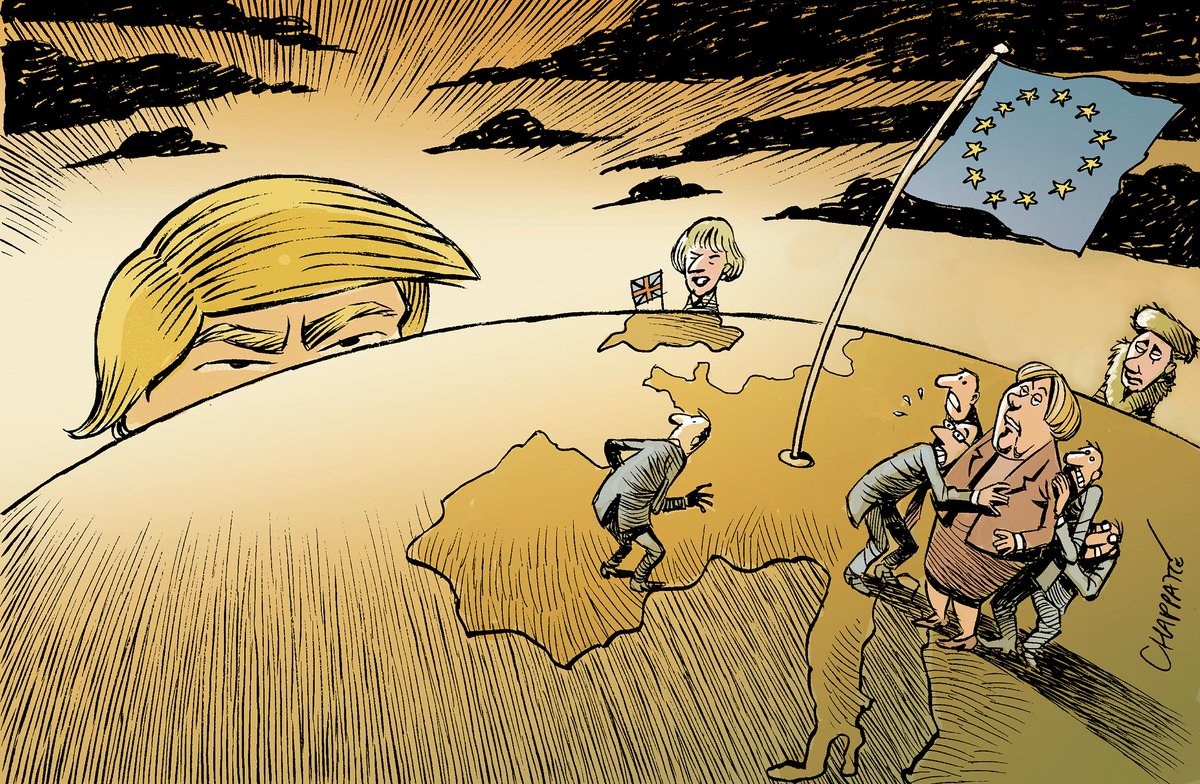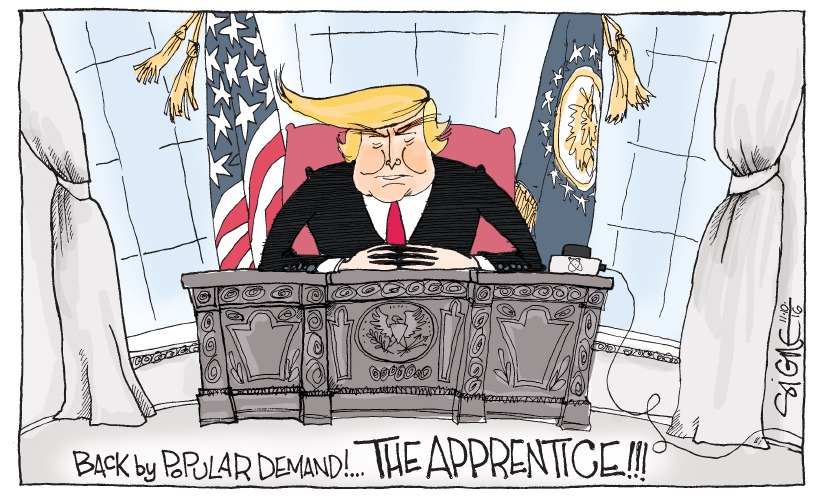Rob's Flash Messages
Rob's Stories
HuddleWorld

Hereby a first glimpse of my latest project. It's not finished yet but ready for a beta release.
A weekly online magazine. But updated hourly for stock prices, 8 times a day for news, 2 times for company analysis, daily for opinions, weekly for stories. The site is still mostly in English but a lot of articles are in Dutch and Spanish as well.
So that’s the advantage for online versus print but hey, what’s new?
Well, not much. It’s a team of about 20 writers, each one with their own background, opinion, style and habits. Directed, redacted and supervised by Bob Huddle (me :). Only this time my team members are not human. They are robots. Enjoy ! :)
Time to Tell Trump: The EU Doesn’t Need You Anymore
Dear EU Leaders,
Donald Trump’s back, and he’s swinging harder than ever. His threat of 50% import tariffs on European goods by June 1, 2025, is a blatant attempt to bully the EU into submission. His playbook—trade wars, NATO ultimatums, and tech dominance—hasn’t changed, but the EU’s response must. The United States, under Trump’s erratic leadership, is no longer the indispensable ally it once claimed to be.
It’s a liability, a protectionist bully that underestimates Europe’s resolve. The upcoming NATO summit in the Netherlands is your chance to show Trump and his team that the EU can stand tall, independent, and unafraid. Here’s a bold, pragmatic strategy to slash Europe’s reliance on the U.S., neutralize Trump’s blackmail, and secure the EU’s economic, military, and geopolitical future. This isn’t about burning bridges—it’s about building a Europe that doesn’t bend to MAGA tantrums.
The U.S. Myth: Overrated and Overplayed
Trump’s America loves to tout its superiority—technological, military, economic—but let’s cut through the noise. The U.S. tech edge? It’s mostly hype, fueled by the cash of ad giants (Google, Meta, X) and retail behemoths (Amazon). Their AI and cloud dominance rely on scale, not genius. Intel’s chip industry is floundering, trailing Taiwan’s TSMC and South Korea’s Samsung. NVIDIA’s GPU empire? A lucky break from gaming cards that just happen to power AI models. Microsoft’s monopoly is a software stranglehold, not a technological marvel. Meanwhile, Europe boasts ASML, the world’s chip-making kingpin, BESI’s assembly process, and a booming drone sector fueled by Ukraine’s battlefield ingenuity. Add CERN, Airbus, Eurofighter, Saab, ESA, SAP, Capgemini to the mix, and it’s clear: the EU isn’t the junior partner Trump thinks it is.
The U.S. military umbrella under NATO? Overrated, too. The U.S. provides 70% of NATO’s muscle, but Europe’s “coalition of the willing”—France, Germany, Poland, the UK, and Ukraine—is stepping up fast. France and the UK have nuclear arsenals; the Netherlands could develop one if pushed. And let’s not forget energy: the U.S. supplies 45% of the EU’s LNG, but Qatar, Norway, and even Russia (yes, Russia) offer alternatives. Trump’s tariffs and threats are a wake-up call, not a death sentence. It’s time to flip the script.
Reciprocity with Teeth: Hitting Back at Trump’s Tariffs
Trump’s 50% tariff threat is a declaration of economic war. The EU can’t just absorb the blow—it must strike back, and hard. Here’s how to make Trump’s team sweat:
-
ASML and BESI Unleashed: The U.S. relies on ASML’s photolithography machines and BESI’s chip assembly tech to keep its semiconductor dreams alive. Europe should loosen export restrictions to China, letting Beijing’s chip industry surge while temporarily freezing U.S. access. This isn’t about cozying up to China—it’s about showing Trump that Europe holds the cards in the global chip race. The U.S. will cry foul, citing the Wassenaar Arrangement, but let’s be real: America’s track record of shredding treaties (Iran Deal, Paris Climate Accord, WHO) makes their complaints laughable. A targeted export pivot to China, under strict civilian-use conditions, will hit U.S. tech where it hurts.
-
Tax the Tech Titans: Google, Meta, and X (Musk’s pet project) rake in billions from European users while dodging accountability. Slap a 5-10% “digital sovereignty tax” on their ad revenues and data usage. The EU’s already a pro at regulation—GDPR and the Digital Markets Act set the stage. Funnel the proceeds into European AI (Mistral), cloud (GAIA-X), and chip production (Chips Act). This isn’t just revenge—it’s a down payment on tech independence. Trump’s cronies will howl, but they’ll see the EU means business.
These moves are reciprocal, not escalatory. Trump’s tariffs would gut European exports (18% of which go to the U.S.), so hitting back at his tech and chip lifelines is fair game. The EU’s economic clout—€2 trillion in U.S. investments and a massive consumer market—gives it leverage. Trump’s team will see the math: bullying Europe comes at a steep price.
Tesla’s Tumble: Let the Market Do the Talking
Elon Musk’s political antics have turned Tesla into a punching bag, but its decline isn’t just about his X rants. Chinese EV makers like BYD, NIO, and Xpeng are outpacing Tesla with better, cheaper cars—9.6 million units produced in 2024 compared to Tesla’s 1.8 million. In Europe, Tesla’s market share dropped to 13% in 2024, while BYD climbed to 8%. European brands like Volkswagen and Stellantis are hitting their stride, too. The EU can accelerate Tesla’s fall by slashing import tariffs on Chinese EVs (currently 9% extra) and boosting subsidies for European producers. This isn’t about punishing Musk—it’s about embracing competition. The U.S. market can’t save Tesla alone, and as its global share shrinks, America’s economic swagger takes a hit.
But don’t overplay the China card. The EU must protect its own EV industry with strategic investments in battery production (CATL, Northvolt) and trade deals with Asia (India, ASEAN) and Africa (AfCFTA). The Belt and Road Initiative—“the silk road”—opens new markets for European and Chinese EVs, bypassing the U.S. entirely. Trump’s protectionism will leave America isolated while Europe thrives on open trade.
Energy Independence: Ditch U.S. LNG, Embrace Alternatives
The U.S. supplies 45% of the EU’s LNG, a dependency born from Russia’s invasion of Ukraine. But Europe has options. Qatar (15% of LNG imports) and Norway (25%) can fill the gap with long-term contracts. Offshore wind in the North Sea—especially above the Wadden Islands—could add 20 GW by 2030, slashing gas demand. Here’s the boldest play: use Russian gas as a bargaining chip. Offer Moscow a deal—return occupied Ukrainian territories (Donbas, Zaporizhzhia) and agree to a ceasefire in exchange for resuming gas exports via Nord Stream 2 or TurkStream. This isn’t about cozying up to Putin; it’s about outmaneuvering Trump. Cutting U.S. LNG ($50 billion annually) hits America’s wallet and shows Europe can play hardball. If peace talks stall, Qatar and Norway are ready backups. Either way, the EU’s energy future doesn’t run through Washington.
Defense: A European Powerhouse Without Uncle Sam
Trump’s NATO threats—pulling out or demanding more cash—are a tired act. The U.S. provides 70% of NATO’s muscle, but Europe’s “coalition of the willing” (France, Germany, Poland, the UK, Ukraine) is ready to step up. France and the UK have 515 nuclear warheads combined; the Netherlands could develop its own if pushed, leveraging expertise from TNO and TU Delft. Ukraine’s drone innovations—battle-tested against Russia—are a game-changer. The EU should formalize a Franco-British nuclear umbrella and fast-track joint projects like the Eurofighter and FCAS. Buying Russian S-500 air defense systems, as Turkey did with S-400s, is a wild card—technically feasible but politically dicey. Better to lean on European systems and Ukraine’s drone prowess.
The NATO summit in the Netherlands is the perfect stage to flex this muscle. Increase European contributions (Poland’s 4% GDP defense spending sets the pace) and shift decision-making to PESCO. The U.S. isn’t irrelevant yet—nuclear deterrence and logistics still matter—but it’s no longer indispensable. Trump’s team will see a Europe that doesn’t need babysitting.
Baltic Checkmate: Locking Russia Out
The Baltic Sea is Europe’s turf now, with Finland and Sweden in NATO and Denmark controlling the Øresund and Great Belt. A maritime blockade—sanctions on Russian shipping and European-led NATO drills—can choke Russia’s Baltic trade and navy without firing a shot. Forget Kaliningrad; it’s already boxed in. Targeting access at Denmark sends a louder message to Moscow and Washington: the EU doesn’t need U.S. carriers to dominate its backyard. This move, paired with cyber defenses against Russian retaliation, cements Europe’s geopolitical clout.
The Silk Road and Beyond: New Partners, New Power
Trump’s America is betting on isolationism, but the EU thrives on global trade. The Belt and Road Initiative opens markets in Asia and Africa—1.4 billion consumers via AfCFTA alone. New trade deals with India, ASEAN, and Canada (CETA) can replace the U.S. market (18% of EU exports). China’s a tricky partner, but selective cooperation—like ASML exports under civilian terms—keeps Beijing engaged without over-dependence. The EU’s cautious approach, unlike America’s hawkish China obsession, gives it room to maneuver. Protectionism will cost the U.S. dearly; Europe’s open markets will pay dividends.
The Russia Gambit: Peace for Gas?
Here’s the wildcard: a peace deal with Russia. Offer Putin a trade—full withdrawal from Ukrainian territories for resumed gas exports and economic access to Europe. This isn’t about trust; it’s about leverage. Russia’s economy craves EU markets, and a deal could sideline U.S. LNG while stabilizing Ukraine. If it fails, Qatar, Norway, and North Sea wind are ready. This move would make Trump’s team choke on their coffee—it shows Europe can rewrite the geopolitical script without Washington’s approval.
The Roadmap: Fast, Fierce, Feasible
- Year 1-2: Hit back with a digital tax on U.S. tech giants and ASML exports to China. Slash tariffs on Chinese EVs, boost European producers, and sign trade deals with India, ASEAN, and Africa. Block the Baltic at Denmark with European-led NATO drills. Formalize a Franco-British nuclear umbrella and integrate Ukraine’s drones. Secure LNG from Qatar and Norway; dangle Russian gas as a peace incentive.
- Year 3-10: Build GAIA-X, scale chip production (Chips Act), and make Africa a trade powerhouse. Develop FCAS, drones, and European intelligence to sideline the U.S. in NATO. Expand North Sea wind to kill gas dependence.
The Message to Trump
Trump will rage, but his staf will see the writing on the wall. Europe’s not a pawn—it’s a power. ASML, BESI, and tech taxes can cripple U.S. industries. Baltic dominance and Russian deals show Europe doesn’t need America’s military or gas. Chinese EVs and global trade routes prove the EU’s economic might. At the NATO summit, show Trump that his tariffs and threats only accelerate Europe’s rise. The U.S. can be a partner, but never again the boss. Lead boldly, and let Trump’s team scramble to keep up.
Little Donald and his Trumpettes" (2025 Edition)
 The political landscape that emerged in 2016-2017 now seems like a preview of what was to come. When Trump first entered the spotlight, his peculiarities – from his "tiny hands" to his Twitter tirades – were treated as comedy fodder. Today, after his presidency, a second defeat, and now his controversial return to power, these seem less amusing and more symptomatic of the broader political deterioration we've witnessed.
The political landscape that emerged in 2016-2017 now seems like a preview of what was to come. When Trump first entered the spotlight, his peculiarities – from his "tiny hands" to his Twitter tirades – were treated as comedy fodder. Today, after his presidency, a second defeat, and now his controversial return to power, these seem less amusing and more symptomatic of the broader political deterioration we've witnessed.
What started as a ripple in 2017 has become a wave. The "Trumpettes," as we called the European populist leaders who emulated his style, weren't just cover artists – they became headliners in their own right. Geert Wilders, once dismissed as a Dutch Trump impersonator with his anti-immigration rhetoric and inflammatory tweets, now leads the Netherlands' government. His victory in 2023 marked a seismic shift in Dutch politics, proving that what seemed implausible in 2017 had become reality by 2024.
Marine Le Pen in France, though unsuccessful in her previous presidential bids, has maintained a stronghold on French right-wing politics, with her party gaining unprecedented local power. The AfD in Germany, which seemed marginalized in 2017 when Frank-Walter Steinmeier was elected president, has since grown from a fringe movement to a major political force, sending shockwaves through German democracy. Steinmeier's re-election in 2022 with 78% of the vote seemed like a bulwark against populism, but the AfD's recent surge suggests Germany isn't immune to these trends.
Brexit, which was still in its infancy in 2017, has played out like a cautionary tale that nobody heeded. Boris Johnson and Nigel Farage's "bragging and humiliation" strategy proved devastatingly effective, leading to years of economic uncertainty and political upheaval in the UK. Scotland's renewed push for independence and Northern Ireland's complex position post-Brexit have only underscored the prescience of those early concerns about British unity.
 The "Trump playbook" – personal attacks over policy, social media warfare, claims of fake news, and the demonization of immigrants – has become a global political template. What we once saw as uniquely American political theater has become a worldwide phenomenon. The tactics that seemed shocking in 2017 – attacking opponents' families (like the "Penelope-gate" scandal that damaged François Fillon in France), crying fraud before elections even occur, and undermining democratic institutions – are now standard political strategies.
The "Trump playbook" – personal attacks over policy, social media warfare, claims of fake news, and the demonization of immigrants – has become a global political template. What we once saw as uniquely American political theater has become a worldwide phenomenon. The tactics that seemed shocking in 2017 – attacking opponents' families (like the "Penelope-gate" scandal that damaged François Fillon in France), crying fraud before elections even occur, and undermining democratic institutions – are now standard political strategies.
Trump's return to power in 2024, after Biden's presidency failed to heal America's divisions, has emboldened populist movements worldwide. The "torches and pitchforks" we metaphorically feared in 2017 have manifested in various forms, from the January 6th insurrection to growing political violence and democratic backsliding globally.
Looking back, our 2017 hope that Trump's chaotic first term would serve as a cautionary tale proved naïve. Instead of being deterred by the American example, populist movements worldwide have been inspired by it. These "cover bands," as we dismissively called them, have learned to play their own tunes, each adapted to their local audience but following the same destructive melody.
The question now, in 2025, isn't whether democracy can survive populism – it's how democracy can be reimagined to withstand it. The music of democracy, it seems, needs new composers.
Rethinking Space Exploration

The popular narrative around space exploration often focuses on establishing colonies on Mars and the Moon, with figures like Elon Musk promoting these destinations as humanity's backup plan. However, a closer examination reveals that this approach may be misguided, both in its premises and its priorities. Instead, focusing on asteroid mining could offer greater benefits with lower costs and technical barriers.
The argument for Mars colonization often rests on the idea of preserving humanity in case of an Earth-based catastrophe. Yet this reasoning faces several critical flaws. First, even a catastrophically damaged Earth would likely remain more habitable than Mars, with its toxic atmosphere, harsh radiation, and minimal gravity. Second, humanity itself is rapidly evolving through genetic engineering and technological integration, making the concept of "preserving mankind as it is" increasingly obsolete. The massive resources required for Mars colonization might be better invested in protecting Earth's environment and advancing sustainable technologies.
By contrast, asteroid mining presents a more practical and economically viable path forward. Near-Earth asteroids offer abundant resources that are often more accessible than their planetary counterparts. While planets and large moons have concentrated their heavy metals in unreachable cores through gravitational differentiation, asteroids often contain valuable materials distributed throughout their smaller bodies. For instance, the asteroid 16 Psyche is estimated to contain vast quantities of iron, nickel, and precious metals in an accessible form, while 1986 DA potentially holds thousands of tons of platinum group metals.
The technical challenges of asteroid mining, while significant, are actually less daunting than those of planetary colonization. Operating in zero gravity eliminates the need for expensive launch and landing infrastructure required on Mars or the Moon. The lack of atmospheric interference and lower gravity wells makes resource extraction and transport more energy-efficient. Additionally, the development path to asteroid mining can be more incremental, with smaller-scale missions building experience and capability over time.
Many technologies needed for asteroid mining could be developed through orbital research stations and targeted missions, without the enormous overhead of maintaining planetary colonies. While some technological overlap exists in areas like life support systems and radiation protection, these could be developed more efficiently through focused research rather than as byproducts of planetary colonization programs.
The economic potential of asteroid mining also far exceeds that of planetary colonies. While Mars colonies would require constant resource input for marginal returns, successful asteroid mining operations could provide rare earth elements, precious metals, and industrial materials at scales that could transform Earth's economy and enable further space development.
This doesn't mean we should abandon Mars exploration entirely, but rather that we should prioritize our investments in space development based on practical returns rather than romantic notions of planetary colonization. The path to becoming a spacefaring civilization might be better served by focusing on developing our capabilities to access and utilize space resources efficiently, rather than rushing to establish colonies on hostile planetary surfaces.
The future of space development lies not in recreating Earth's environment on other worlds, but in adapting our approach to take advantage of the unique opportunities space offers. Asteroid mining represents a more pragmatic and potentially more rewarding next step in humanity's space journey.
(Credit picture SciTechDaily)
Page 1 of 6









